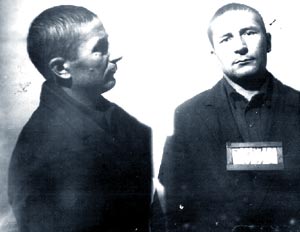









The Russian farmer Georgiy / Yegor (son of Pavel) ANANYEV (1873-1931) was arrested in the settlement of TATAUROVO, ULYOMOVSK district, region of EAST-SIBERIA (today CHITA region), on the 10.09.1930; he was native of the village of SLOBODA, province of IRKUTSK. He was removed to the prison in CHITA.
A “Special three-member Board” of the plenipotentiary representation of the East-Siberian district OGPU sentenced him to maximum penalty on section 58-10,13 on the 06.02.1931; he was executed (obviously in CHITA) on the 28.02.1931.
The Department of Public Prosecution of the Chita region rehabilitated him posthumously on the 27.11.1989.
In the June of 1931 his wife and children (according to a decision of the “Troyka of expulsion affairs” dated the 14.06.1931)
were deported away from TATAUROVO (the son from CHITA where he went to school) to KRASNOYARSK and then to the village of USTUG, district of KRASNOTURINO (on the river Ubey).
 G. (P.) ANANYEVS eldest son, Mitrofan ANANYEV (1903-1942), who came from
Tataurovo, was working in the Far East at that time, but his wife and children
lived in TATAUROVO. They were also deported to USTUG, together with G. (P.)
ANANYEV’s family:
G. (P.) ANANYEVS eldest son, Mitrofan ANANYEV (1903-1942), who came from
Tataurovo, was working in the Far East at that time, but his wife and children
lived in TATAUROVO. They were also deported to USTUG, together with G. (P.)
ANANYEV’s family:
They were taken to USTUG in the August of 1931. V. (M.) ANANYEVA perished there. In November of the year 1931 they were moved from USTUG to the settlement of KICHIBASH on the river SISIM.
Relatives informed M. (G.) ANANYEV about the expulsion of his family into internal exile, and thus he went to KICHIBASH. There he worked in the NOVOSYOLOVSK timber pro-cessing industry, as did the exiles; however, he did not have to appear at the commandant’s office for registration and periodic check. In 1932 he returned to Transbaikalia, abandonning his wife and children in exile.
In April of the year 1934 the ANANYEVs were taken from KICHIBASH to the settlement of ZHULGET, NOVOSYOLOVO district (the villagte Soviet was in Smolenka). The settlement consisted of about 20 barracks, each of which being devided into four sections. In each of the sections lived two families.
In 1935 the commandant gave N. (G.) ANANYEV the permission to leave for KRASNOYARSK for studies. He would have liked to register himself at the technical secondary school, but he was chased away, as soon as they had become aware of his being an exile. Thus he had no choice but to register himself at the PVRZ (locomotive repair work-shop) industrial training school.
As soon as he had finished school the militia summoned him and sent him back to ZHULGET. There he was mobilized in December of 1942; however, they did not send him to the front, but to the rearward units in Novosibirsk. While he was in the army he worked in a car repair shop. In 1943 the repair shop was transferred to Moscow. N. (G.) ANANYEV worked there until the summer of 1946, when he was demobilized and finally given a passport.
The exiles in ZHULGET were released after the war.
M. (G.) ANANYEV worked at BORZYA station for a construction project and later as a foreman for the military construction zone, in the village of GORNIY ZERENTUY, NERCHINSKO-ZAVODSK district, CHITA region (20 km away from Aguni, that is to say from the Chinese border).
He was arrested on the 03.11.1938 and put to the remand prison of the Nerchinsko-Zavodsk frontier guards. When they searched his house they confiscated documents, bonds and a bicycle. Afterwards they took him to the prison in CHITA.
On the 29.09.1939 the NKVD Special Board sentenced him on section 58-10,11 to 5 years and sent him to the SVITL (South-East corrective labour camp), to the forced labour camp sub-sector SHTURMOVOY (separate camp sub-sector of YAGODNIY). He died there one the 22.01.1942 of complete exhaustion.
He was posthumously rehabilitated by the military tribunal of the Transbaikalian military district on thew 23.01.1959.
F. (T.) ANANYEVA and K. (P.) ANANYEVA were rehabilitated by the UVD Information Center of the Chita region on the 08.07.1994, M. (M.) ANANYEVA on the 12.09.1994 and N. (G.) ANANYEV on the 23.08. 1995, both by the UVD Information Center of the Krasnoyarsk region.
25.05.1998, recorded by V.S. Birger, Krasnoyarsk, “Memorial” Society
Archives